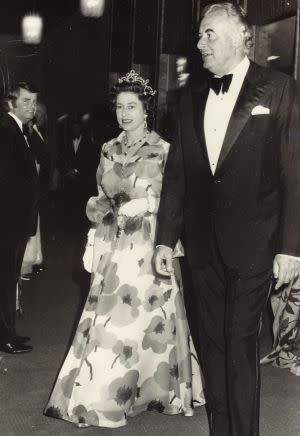
The battle to read Sir John Kerr’s correspondence with Buckingham Palace regarding the Whitlam government’s dismissal in 1975 is not over, says Monash Professor Jenny Hocking.
On March 16, Federal Court justice John Griffiths, handing down his decision in the ‘Palace letters’ case, noted the “clear public interest in the content of the records” that are held in the National Archives of Australia. Yet he also found that the letters between the then Governor-General and the Queen about the constitutional crisis cannot be released. The ‘Palace letters’ case was taken by Professor Hocking, seeking the release of the letters and led by the 74-year-old Antony Whitlam, QC, Gough Whitlam’s eldest son, who worked with the legal team on a pro bono basis.
Although the letters "address topics relating to the official duties" of the Governor-General, the court deemed them to be “personal”. Legally, this means that they're not Commonwealth records and are therefore not subject to the Archives Act. As it stands, the letters remain embargoed by the Queen and can't be released until 2027, and even then their release will be subject to approval by the Queen’s private secretary and the official secretary of the Governor-General.
Professor Hocking has called on Prime Minister Malcolm Turnbull to make good his offer – made in 2015 – to request the letters from the Queen. But she acknowledges that Mr Turnbull is unlikely to follow through given the conservatism of his party, and his decision to place his republican ambitions on hold. “I think it’s gone into the too-hard basket,” she says.
Professor Hocking is Emeritus Professor at Monash University’s Centre for Australian Studies, and the author of the award-winning two-volume biography of Gough Whitlam (Gough Whitlam: A Moment in History and Gough Whitlam: His Time) and, most recently, The Dismissal Dossier: Everything You Were Never Meant to Know about November 1975 – the Palace connection. She says her legal team is examining whether to appeal the decision to the full bench of the Federal Court – they have 21 days to decide.
Another possible solution is for Parliament to amend the Archives Act to ensure that all correspondence between the monarch and the Governor-General comes under it. This means that any appeal against a refusal of access would entail a relatively straightforward application to the Administrative Appeals Tribunal, instead of the more complex and onerous process of applying to the Federal Court.
“There could be no better example of our arcane and subservient status as constitutional monarchy than this – that we cannot know the full history of the dismissal of the Whitlam government until the Queen says we can.”
The letters are held in and maintained by the National Archives of Australia. Justice Griffiths acknowledged that they relate to “one of the most controversial and tumultuous events in the modern history of the nation”, but access to them is controlled by the Queen. Professor Hocking has said of the conundrum: “There could be no better example of our arcane and subservient status as constitutional monarchy than this – that we cannot know the full history of the dismissal of the Whitlam government until the Queen says we can.”
Some details are known
The content of the letters isn't entirely secret. In 2012, while researching Sir John Kerr’s papers in the National Archives, Professor Hocking came across references to the letters. She discovered that the Queen, Prince Charles and the Queen’s private secretary, Sir Martin Charteris, “knew that Kerr was considering dismissing Whitlam from as early as September 1975, when Kerr confided this to Prince Charles”.

Kerr’s papers also contained a record of his secret discussions with High Court justice Sir Anthony Mason from March 1975 to late in the afternoon of the dismissal itself, on November 11. Kerr knew that Whitlam had been planning to announce a half-Senate election on that day, as a way of breaking the impasse caused by the Senate’s failure to pass Supply. But before Whitlam could call the election, Kerr dismissed him, a move Whitlam later described as “the ambush”. Kerr then appointed a government led by the leader of the opposition, Malcolm Fraser. Supply was passed later that day. Whitlam then returned to the House of Representatives, which passed a no-confidence motion in the appointed Fraser government – as Whitlam had anticipated it would.
Professor Hocking says that when the events of the day are recalled, Whitlam’s return to Parliament and the no-confidence motion are often forgotten. But she argues they're significant for a number of reasons. Firstly, they demonstrate Whitlam’s deep faith in the institution of Parliament and its traditions – he rightly believed that the House of Representatives would restore his government and reinstate him as prime minister. But the Kerr papers revealed that Anthony Mason, the Governor-General’s friend on the High Court, advised that the no-confidence motion was “irrelevant”. Kerr refused to receive the Speaker of the House or to acknowledge the vote of the House of Representatives, along with its call to restore the Whitlam government.
“By ignoring this critical motion of no confidence in Fraser, Kerr had repudiated the defining feature of our parliamentary democracy – that the party which commands a majority in the House of Representatives forms government,” Professor Hocking has written.
Anthony Mason’s role remained secret for 37 years until revealed in Hocking’s biography of Whitlam – he went on to be named chief justice of the High Court by the Hawke Labor government in 1987.
Belief in parliamentary democracy
Professor Hocking was an economics student at Monash when Whitlam was dismissed. She was 21 and “extraordinarily shocked that an elected government could be dismissed from office while it retained the confidence of the House of Representatives”. From the steps of Parliament that day, Whitlam called upon Australians to “maintain your rage and your enthusiasm”. Professor Hocking says her own enthusiasm for parliamentary democracy, which Whitlam believed in so profoundly, has remained undimmed since that time. It's one reason she doesn't want to give up on the ‘Palace letters’.
At the time of the dismissal it was standard practice for the Australian Governor-General to send despatches to Buckingham Palace. Professor Hocking says all of Kerr’s communications with the Palace, including those relating to the dismissal, are of historical interest. “It is not only these letters, but all communications between the Governor-General and the Queen that are now withheld from the Australian public,” she says. “That is an extraordinary level of secrecy at the highest level of governance in a constitutional monarchy.”
“It is not only these letters, but all communications between the Governor-General and the Queen that are now withheld from the Australian public. That is an extraordinary level of secrecy at the highest level of governance in a constitutional monarchy.”
After Sir John Kerr’s death, “the original terms under which Kerr had lodged the papers was changed at the instigation of the Queen”, she says. The usual 60-year embargo was reduced to 50 years, but the condition that the Queen’s private secretary be consulted was also changed – the secretary’s permission is now required.
The correspondence includes telegrams, other people’s letters and newspaper cuttings. Local reporting on the Whitlam government’s ambitious reforms were highly polarised during those tumultuous years, she says. “It’s very important that we know what version of history Kerr was passing on to the Queen.” In relation to the dismissal itself, “was he informing the Queen that he was privately meeting Anthony Mason? Did he tell the Queen that Whitlam had decided to call the half-Senate election?”
Professor Hocking says the secrecy surrounding these events propels the case for Australia to become a republic. It's time to end to what Whitlam called these “relics of colonialism”.





